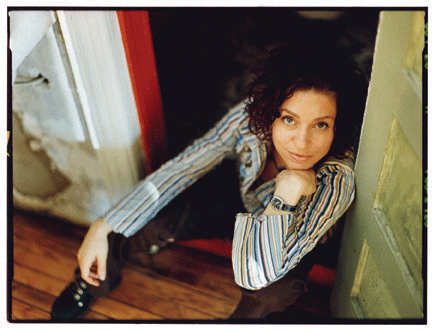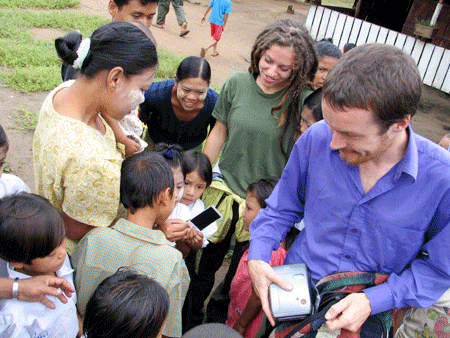Burlington’s music oracle Melo Grant, mainstay of WRUV radio, has seemingly always had the uncanny knack of recognizing up and coming talents to keep an eye on. So we found ourselves in 1990 among the lucky few dozen people in the audience at Club Metronome, candlelight flickering at each round table, nonchalantly waiting to hear a young singer/songwriter hailing from Buffalo, NY. Melo, enticed by the fresh, original sound she’d heard from an advance EP recording, assured us post-punk feministas that we were going to like the kinds of things the Buffalo girl had to say, too. For that’s what she was, a girl, barely 18 if that.
She came out, a lone figure deftly wielding a guitar with a voice and delivery style that left everyone present sitting up and taking astonished notice.
She was just a babe, and was she ever righteous, if by that we mean a force to contend with who left an inspired new community in her wake.
Photo: danny clinch
Ani DiFranco, with baby on board, will hit the Flynn Mainstage on Nov. 13
 “Yeh, I remember that little joint!” laughs Ani DiFranco, the Righteous Babe herself, recalling the first of her many subsequent – though grander scale – visits to Burlington. Perhaps she says that to all the girls who cite their first Ani encounter, but even if she’s just indulging me, the engagingly gracious down-to-earth manner of DiFranco is no act. She spoke to VW from on the road in Lawrence, KS in advance of her November 13 Flynn Theater show, one of the last ones before her ever more pronounced pregnancy sends her on hiatus.
“Yeh, I remember that little joint!” laughs Ani DiFranco, the Righteous Babe herself, recalling the first of her many subsequent – though grander scale – visits to Burlington. Perhaps she says that to all the girls who cite their first Ani encounter, but even if she’s just indulging me, the engagingly gracious down-to-earth manner of DiFranco is no act. She spoke to VW from on the road in Lawrence, KS in advance of her November 13 Flynn Theater show, one of the last ones before her ever more pronounced pregnancy sends her on hiatus.
Taking the state of the world deadly seriously, while punctuating bemused talk of herself with a self-deprecating joyful laughter, the 35-year-old DiFranco is an eloquent, impassioned woman, the sound of whose everyday conversation is every bit as poetic as her lyrics and rhythmic as her music. Dubbed the Sultress of Staccato by College Music Journal when heralding her as one of the top 25 most influential artists of the past 25 years: “iconoclastic and recklessly driven people like her are far more dangerous to the recording industry than some straw man like ‘downloading.’” At once a Joni Mitchell, Patti Smith, and K.D. Lang for the next generation – DiFranco’s social critiques and personal sexual identity has resonated with youth in search of fluid new ways of being in the world.
Rust Belt Roots Rock
Before the age of ten, Ani was playing guitar, and by the time she hit the age of majority she had struck out on the road. She created her own recording label, Righteous Babe Records, determined even then to enable herself to do it all her way. Not only has she remained independent, declining lucrative offers to sign with a “major” record company, but now DiFranco has brought other artists onto the Righteous Babe label, among them Toshi Reagon, daughter of Sweet Honey in the Rock’s Bernice Johnson Reagon. What’s more, Righteous Babe is still headquartered in the Nickel City, DiFranco’s hometown of Buffalo (incidentally, her mother is one of its half a dozen or so employees).
Through the 1990s, Righteous Babe was situated in a particularly dilapidated stretch of Buffalo’s long-forsaken Main Street, an effort on DiFranco’s part to infuse life back into that part of the Rust Belt she calls home. Likewise, the businesses utilized by Righteous Babe for services, from printing to graphic design and photography for DiFranco’s music projects, are from Buffalo, not Manhattan. Righteous Babe has been at the forefront of a major historic preservation effort, with DiFranco and manager Scot Fisher saving a landmark downtown church from demolition, and financing the renovation so that the lovely structure moved from death row to becoming the new home of a contemporary arts facility. The building now features an innovative geothermal heating system, and a “fancy-pants” company noted for working on Carnegie Hall has been contracted to rehab a section of the massive church into a state-of-the-art performing arts venue, DiFranco reports.
So, as anti-establishment as DiFranco’s politics are, she has also committed something to making civic pride hip. “Buffalo, for generations, has been a place that the young and dynamic evacuate as soon as they can,” DiFranco said in a June 2006 interview with Deanna Zandt for AlterNet. “They head to New York or to Chicago because Buffalo can’t sustain them. But if you’re dissatisfied with your city, rather than leave it, change it! Start somethin’! Not only is acting locally or getting involved in something in your community where it’s at politically in terms of ‘changing the world,’ — it’s fun. It’s invigorating.”
To dwell on such things made possible by DiFranco’s financial success endangers invoking her dismay, if not ire. After being touted in the 25th anniversary edition of Ms. magazine in 1997 as one of “21 feminists for the 21st century” – DiFranco wrote a lengthy letter to the editor expressing her chagrin – not, it should be emphasized, for being called a feminist, a label she embraces, but for her success being defined in financial terms. “So here I am,” she wrote, “publicly morphing into some kinda Fortune 500-young-entrepreneur-from-hell, and all along I thought I was just a folksinger!… We have the ability and the opportunity to recognize women not just for the financial successes of their work, but for the work itself. We have the facility to judge each other by entirely different criteria than those imposed upon us by the superstructure of society. We have a view which reaches beyond profit margins into poetry, and a vocabulary to articulate the difference…. Thanks for including me, Ms., really. But just promise me one thing; if I drop dead tomorrow, tell me my grave stone won’t read:
ani d.
CEO.
Please let it read:
songwriter
musicmaker
storyteller
freak.
But even such an expanded epitaph would not accurately encompass all that DiFranco is in the public realm, not the least of which is her feminist-imbued social activism.
Bold Woman of Courage

[Photo: Danny Clinch]
In July, the National Organization for Women (NOW) gave DiFranco its 2006 “Woman of Courage” Award at its annual convention, the first musician to ever receive the honor, which is awarded to “courageous and bold” women who have worked diligently for women’s rights. NOW noted her uncompromising determination to give voice to women’s concerns.
DiFranco has postulated that the term feminist was deliberately turned into a dirty word during the cultural backlash of the Reagan Bush era because it challenged the existing power structures – it was made to be taboo, ugly, passé. She observed tangible evidence of this while at the NOW convention for, when noting who was there, she saw who she describes as the Old Guard, women in their 50s and 60s who’ve been doing the work of feminism for many years, and then the 20-somethings and girls in their teens. While she acknowledges that this is heartening, she sees it as proof of the break in the continuum caused by that backlash.
While at the NOW convention, she shared the news of her pregnancy. In a song from her most recent cd, Reprieve, she writes that having a child "is the most radical thing you can do.” Having consistently been a radical agitator for some time now, though not yet having given birth, it begs the question of just what DiFranco perceives as so radical. As she explained it to Matt Rothschild on Progressive radio [visit www.progressive.org/radio for the full interview], “The act of reproduction, of creation, is pretty revellating [sic] – physically, spiritually. But these days with this combination of technology and patriarchy and over-medicalization of birth, women have too often been ejected from that seat of power. You get brought into this artificial environment, strapped down and have it cut out of you. That whole transformative experience in which our greatest pain becomes our greatest transcendence which transmutes into our greatest power – is taken away.
“I’m new to this, this is my first, but I already feel pretty revellated just by the experience of being pregnant,” DiFranco continued. “It’s kind of magic! That can be very threatening stuff for a power structure, and therefore the controlling of it – the assuming of the power, taking that power back has been the quest of the darker side of patriarchal culture. But the circumstances of having a reproductive system – the hormones, the emotionalism, everything we look at as a woman’s weakness – a holistic view is to understand that it’s also a great power. The irrational perception of women due to that biological state – is also a great wisdom – it makes a lot of sense to cry when you watch the news. The supposed rational alternative is quite insane if you think about it.”
DiFranco took time to talk with Vermont Woman about the state of the world and her upcoming show in Burlington.
MM: You were honored by NOW as being a “bold and courageous” woman; who are some of the courageous and bold women to whom you have looked up?
AD: So many… starting with my mom! She has always been a creative person, a very independent person, a brave, brave woman and quite literally a feminist – a conscious feminist from as far back as I can remember – and yet she treated me with a lot of respect and really empowered me from the beginning as a really independent kid. The message that I got from the beginning was ‘I respect your judgment – go for it!’ So that really set the stage for my whole life.
Beyond there, I’ve had so many powerful teachers – many of them came to me through writing – all kinds of powerful voices like Audre Lorde, Alice Walker, Carol Gilligan – and so many more.
MM: The closing line of the title track of Reprieve states: “Feminism ain’t about equality, it’s about a reprieve” – what do you mean by this?
AD: I’ve been thinking a lot about feminism – and especially lately realizing it’s really not just for chicks anymore. I think we have to evolve our collective idea of feminism… I still do interview after interview where I’m asked “Is feminism really relevant anymore?” [said in deep mock “authority” voice] – “aren’t we past that and isn’t it all just fine now?” – “Shouldn’t we be talking about more pressing things?” is the vibe – the war, or the environment… I see things like war, things like the plundering of the environment as fundamentally (if you will) patriarchy run amok. These are all patriarchal diseases: social, political diseases and we really have to approach them holistically and go start at the core of the fundamental imbalance from which all of these diseases are born which I think is the work of feminism.
So, not only is it not in my mind irrelevant anymore, it’s more relevant than ever. If we could just conceive of it as being not just about “equal pay for equal work” about – like that poem says – a reprieve from the doom that we are facing on so many levels – we could see it as all of our work.
MM: Do you see this as a more structural and systemic rather than the fault of individual men?
AD: Yeah, absolutely; I mean women can be agents of patriarchy just as easily as men. You have the obvious examples – the Condoleezza Rices, the Margaret Thatchers… and men can be feminists and part of the alternative consciousness – it’s much more complex than women and men, it’s patriarchy. I don’t think the answer is matriarchy – that’s like some sort of crazy science fiction – but an actual balance and an interplay – a dynamic interplay between the sensibilities of the two sexes which will create that essential balance in the political and cultural sphere.
MM: You had settled in New Orleans, when?
AD: Kind of last summer (2005), officially [laughs ironically] – I’ve been hangin’ out there for years but I kind of hunkered down at - a bizarre time.
MM: You left the city on the eve of the storm hitting, but having left the master tapes for Reprieve in your apartment, you decided to go back to try and get them, I understand. What’s your recollection about going back into New Orleans and is there anything you’d like to debunk about what people generally assume happened?
AD: One thing I can testify to is that it was easy as pie – it was a matter of stepping on the accelerator and getting our little compact car back into town on Thursday after the storm hit Monday morning. So, the fact that we saw no relief workers at all, no Army, no National Guard, no FEMA, no body there providing anything for anyone that was abandoned and left behind was not a fact of “oh, you can’t get in there.”
This business of the “helicopters were getting shot at! – you know, it’s a hostile environment and how can you begin to try and help these people.” For a week you had helicopters flying over people who are stranded on rooftops, people who have no water, no food, who are subjected to 100 plus degree temperatures and dying and panicking – and, they’re not landing, they’re not helping you.
It is just as conceivable to think that whatever shooting up toward the helicopter that was occurring was like “Down here. We’re down here.” You had people writing “help us” huge on rooftops and no one was landing. They were taking photos. And having press conferences. It was completely unconscionable, brutal, and insane what the government did not do for the people of New Orleans – and continue to – I still live there and it’s really amazing to see people – what choice do you have – the people that do have the means to rebuild are slowly but surely investing everything they’ve got to recovering their homes, recovering their businesses, their lives, and even knowing the fact that the levees are the same – in other words, completely inadequate.
They patched the holes and then they’re just sort of on that same campaign of the national politicians of you just tell lies: “oh it’s fine, it’s fine, it’s great…” whatever. People there; there’s all kind of efforts to petition the Corps of Engineers, the levee board, the local/state/federal governments for funding for – to really provide adequate infrastructure. It’s not happening despite incredible efforts on the parts of political organizations and citizens. So, it’s sort of this very tenuous situation still.
 MM: We marched in the Code Pink pre-Iraq invasion march, and the March for Women’s Lives; and it was so exciting at the time – there was so much popular support – yet they defied us – what keeps you going, what keeps you from getting down?
MM: We marched in the Code Pink pre-Iraq invasion march, and the March for Women’s Lives; and it was so exciting at the time – there was so much popular support – yet they defied us – what keeps you going, what keeps you from getting down?
[Photo: Susan Alzner. DiFranco (center) with her manager Scot Fisher (right) at the 2004 March for Women's Lives in Washington D.C. On the left are Christine Lahti, Whoopi Goldberg and Frances Fisher.]
AD: I think it is exactly the kind of acts that you’re talking about that keep me going. Our freedom comes from those acts – not even, necessarily, from the success that may or may not follow them or the victory that may or may not be ours at any turn – it’s the freedom that we feel in our souls, in our spirits when we gather together and when we feel our own power and when we’re surrounded by truth and love and when we’re generating it and reveling in it!
For me, just being active, being out there and traveling around and being outspoken and attempting to be part of the solution is what enables me to sleep at night and I think I would feel much more helpless and hapless and hopeless if I wasn’t this active and just sort of sitting and yelling back at the TV. So, all of these little things that we have the power to do I think are exactly what empower us and it’s certainly like you say getting more and more difficult to be hopeful – it’s in the face of such insanity that we are attempting to live that it’s hard to keep the energy in the resistance going but I think that every ounce of energy that we invest we get back in some elusive way.
Ani Difranco has said, "Whether for sixty people or six
thousand, I bust my ass," and guests of the Flynn Theater
on Nov 13 should see no less.
Photo: Petra Arnold
 MM: At one of your concerts at a New Jersey venue in March 2003 you offered the organization Not in Our Name (www.notinourname.net) the opportunity to have information on display against the Invasion of Iraq. The venue threatened to cancel the show, and you called their bluff saying okay, fine. They caved and you were able to have NION’s Miles Solay address the crowd. Did you get any repercussions about that?
MM: At one of your concerts at a New Jersey venue in March 2003 you offered the organization Not in Our Name (www.notinourname.net) the opportunity to have information on display against the Invasion of Iraq. The venue threatened to cancel the show, and you called their bluff saying okay, fine. They caved and you were able to have NION’s Miles Solay address the crowd. Did you get any repercussions about that?
AD: Well, no – I don’t know that I’ve been invited back there! But, I think that was one instance of a small little victory – there are just apparatuses like that that expect you to comply – and when you don’t, and you don’t en masse… what can they do?! You’re gonna pull the plug on the show. Okay – go for it! You see what these few thousand people have to say about that... Unfortunately, as far as news coverage of these things, it’s stunning how many people just read the White House press release instead of doing any investigative reporting, and those who participate in that collective forgetting. All the times that people have said “well it was a real shocker when George Bush not only got elected once but twice” – I’m like whoa! Stop! Both those elections were stolen! Okay, let’s start at the beginning! Just because you don’t hear that on the nightly news doesn’t mean it’s not obvious. The fact that people are not talking about it more is merely evidence of people’s complacency – not any lack of evidence... You have to keep reminding yourself of what the reality is in the face of all this numbing brainwashing rhetoric.
MM: At that time of the NION event, you cheered “The People 1, Random Knuckleheads 0!” What score do you think we’re at these days?
AD: [laughing ruefully] Well, the Knuckleheads have quite the PR team, and that’s really a powerful force – you get the TV behind you and all of those channels and it’s really hard to compete with all that money, and all that power. But, I think it just doesn’t matter: When you’re standing on the side of truth you are elevating yourself and everybody you interact with and, whatever the score is, you are winning.
MM: During the summer of 2004, you traveled to Burma on a trip organized by the United States Campaign for Burma, visiting refugee camps. What got you involved?
AD: I received an invitation to go to this place called Burma and I didn’t know anything about the situation there at the time. It was this campaign to get public people to learn about what’s happening in Burma and spread the word. The people of that country – it’s just an incredibly violent military dictatorship enacting something like genocide out in the countryside; in the jungle there’s all these ethnic minorities who are being massacred, landmines proliferating everywhere, intense violence and awfulness, repression.
 So, I went there for a week and I spoke with political prisoners who had either escaped or were finally released – people who’d been tortured. I went to refugee camps and to orphanages; I met with these great women who had started a women’s organization of weavers trying to help people in the refugee camps. It was an incredible experience to meet people who really had a perspective on how bad it can be and how important – how glorious – an ideal like democracy is. Here were people who were risking their lives for something like democracy or the right to vote and be empowered. Coming from my country where people have these rights and don’t exercise them – it was such a reality check. Such a reminder of this incredible apathy that exists here and to see people risk their lives for the right to vote was really reinvigorating for me about how important it is to use that right.
So, I went there for a week and I spoke with political prisoners who had either escaped or were finally released – people who’d been tortured. I went to refugee camps and to orphanages; I met with these great women who had started a women’s organization of weavers trying to help people in the refugee camps. It was an incredible experience to meet people who really had a perspective on how bad it can be and how important – how glorious – an ideal like democracy is. Here were people who were risking their lives for something like democracy or the right to vote and be empowered. Coming from my country where people have these rights and don’t exercise them – it was such a reality check. Such a reminder of this incredible apathy that exists here and to see people risk their lives for the right to vote was really reinvigorating for me about how important it is to use that right.
[Photo: Susan Alzner. DiFranco shows a polaroid photo to children in a border village of Burma. She and Damien Rice were the first musicians to visit the village and refugee camps along the border.]
MM: Given your tendonitis problems and the other “big news” that you have [Difranco laughs], what do you anticipate for your touring in the next few years?
AD: Jeez, I have no idea! I’m new to this! It’s already getting a little challenging to kind of set that guitar on top of the little critter. I’m like what the hell am I gonna do come November – I’m kind of twisting sideways a little to make room for instrument and baby. I don’t know if I’m gonna have to pull up a chair or what’s gonna happen! And then beyond that of course it’s just an utter mystery; I figure I’ll take some time off in the winter and play full-time sow and then I’m not sure when I’ll get back on my horse but – I figure this baby’s been touring for five and a half months already and must be pretty used to it!
MM: What might the Burlington audience expect about your upcoming show?
AD: I have a little unconventional band going on these days – my partner in music of the last few years, Todd Sickafoose, will be playing bass and then we have a new compadre on vibraphone, marimba, and other miscellaneous junk; his name is Mike Dillon. So it’s a little trio – so that’s exciting, kind of fleshing out the instrumentation just a little more. And, we’ll have Mr. “Hamell on Trial” opening the show who is always a great and welcome voice in these hard times.
MM: Let’s look positive on the first part of November…
AD: YEH!
MM: So if the Dems take the Senate back…
AD: Not IF, WHEN!! (laughs heartily)
MM: …so when that happens, Vermont Senator Patrick Leahy will be the chair of the Judiciary Committee – is there any message you have for him of what you’d like to see him do?
AD: Oh my goodness, well, [laughs] alphabetically? Chronolog-ically? Astrologically? It’s just essential that we all get out there and vote and change this Congress and this will be, the “end of the end” – I mean, the alternative is just... is unthinkable. The nuclear proliferation, for example. I was reading a Pentagon report from 2001 or ‘02 laying out the plan for World War III, basically. They’re enacting this whole plan – getting, inspiring these other countries to get nuclear weapons of their own so that we can – the height of insanity. On so many levels, it is essential that we must shift the power base.
And then I think we’ll have momentum – not just that those few people in Congress will have momentum, but the whole rest of us will, too, when we don’t have that big brick wall surrounding us... So, Act One: vote.
It’s nice to talk to ya and I look forward to coming back up to old Burlington
